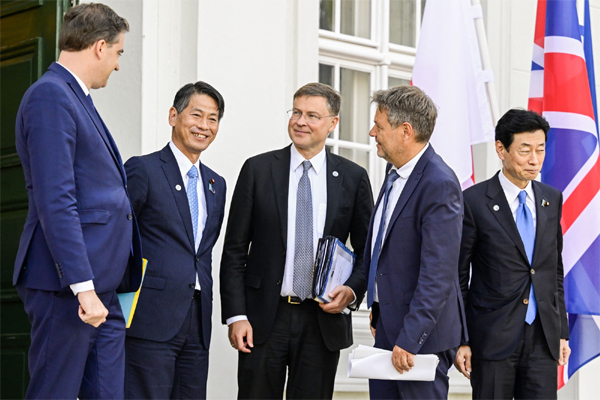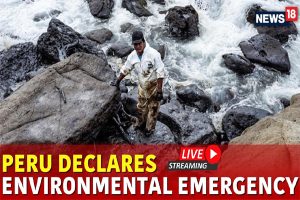
By Javier Blass
As nearly 200 nations gathered at the COP27 United Nations climate summit last week, Japan announced a little-noticed change that sheds light on what’s going on with global energy and climate change diplomacy behind the scenes. Without fanfare, Tokyo rebranded its state-owned natural resources company, which helps local companies to invest in overseas oil, natural gas and mining projects, as the “Japan Organization for Metals and Energy Security.”
It may sound like a trivial name change, but it’s an important indication of where the priority lies for many nations, particularly in Asia. Energy security is top of mind.
It matters too that Japan is leading such a focus, because Tokyo will chair the Group of Seven nations in 2023, giving it a powerful pulpit to shape the global agenda. Japan hasn’t yet announced its G7 priorities, but I hear from diplomats in Asia that energy security will be a big one.

In the world of natural resources, policy makers have long wrangled with a trilemma: how to achieve security of supply, keep prices low and protect the environment — at the same time and for commodities from crude oil to wheat to aluminum. Such a trilemma has often meant one of the three gives way to the other two.
In the 1970s and 1980s, with fresh memories of the first and second oil crises, security of supply and affordability trumped sustainability. In 1979, for example, the G7 nations went as far as pledging in their annual summit “to increase as far as possible coal use” to lower energy costs. The trilemma balance started to change in the early ‘90s with the rise of the modern environmental movement. And over the last decade, as the evidence of global warming mounted, climate change has taken priority.
The current energy crisis is forcing governments to weigh their priorities again. Security and affordability are making a comeback. True, policy makers insist they are not backtracking on their fight against climate change. But it’s clear that the environment is no longer the absolute priority. At best, it’s first among equals. At worst, it comes second.
Take the view of Yasutoshi Nishimura, Japan’s minister of economy, trade and industry, an extremely powerful body better known by its METI acronym. “Countries share the goal of achieving carbon neutrality while at the same time ensuring a stable energy supply,” he explained last week at the Bloomberg New Economy Forum conference in Singapore. Note how he puts climate change and energy security at the same level.
The new emphasis on security is a key reason why COP27 made so little progress on what really matters for the fight against climate change — i.e., the need to reduce fossil fuel consumption and emissions of global warming gasses. Rich countries took a first step toward paying poor ones for the losses they suffer due to climate change, but the summit did little elsewhere. The European Union had to threaten to walk away to avoid further backsliding on goals.
In many ways, this shouldn’t be surprising. Despite claims that the energy crisis wouldn’t derail the fight against climate change, it’s simply impossible that governments would not rethink priorities. Even the richest countries grouped in the OECD club are suffering. This year, they will spend 17.7% of their gross domestic product on energy, according to OECD calculations, the second highest ever and almost matching the 17.8% of 1980-1981 during the second oil shock.
Fortunately, today’s energy trilemma isn’t as difficult as the one G7 policy makers grappled with in 1979, when they turned to coal as a solution, ironically, during a summit in Tokyo. Four decades later, renewable energy makes it possible to both protect the planet and improve security.
As Vladimir Putin has shown this year when he weaponized gas supply against Europe, fossil fuels do not confer better security than green energy. The G7 needs to push for more wind and solar, improve supply chains, increase spending on research and development, and fast-track project approval. One-house, one-solar-panel should be the aim. Nuclear is also an excellent tool that brings together the environment and security.
And the biggest contribution that Japan could make to resolve the energy trilemma is to focus on lowering demand. The best source of energy is that which isn’t being consumed.
In the past, policy makers erroneously tried to address climate change by restricting supply even as demand kept rising. As a result, the global economy has under-invested in new oil and gas supply and prices are likely to remain higher than they should have been. The solution is to work to lower demand — and fast.
That’s easier said than done, of course. For now, fossil fuel demand is going up, with oil, gas and coal likely to set new consumption records in 2023. As long as that’s the case, the world will be heading in the wrong direction.
But Japan can show there’s another path. In 1979, it consumed 5.5 million barrels a day of crude oil; this year, it will demand just 3.4 million. That’s a step toward solving the trilemma, but replicating it elsewhere will require a huge and costly effort to electrify everything from heating to driving. The G7 needs to step up once again.
_________________________________________________________________________
Javier Blas is a Bloomberg Opinion columnist covering energy and commodities. He previously was commodities editor at the Financial Times and is the coauthor of “The World for Sale: Money, Power, and the Traders Who Barter the Earth’s Resources.” @JavierBlas. Energiesnet.com does not necessarily share these views.
Editor’s Note: This article was originally published by Bloomberg Opinion, on November 24, 2022. All comments posted and published on EnergiesNet.com, do not reflect either for or against the opinion expressed in the comment as an endorsement of EnergiesNet.com or Petroleumworld.
Use Notice: This site contains copyrighted material the use of which has not always been specifically authorized by the copyright owner. We are making such material available in our efforts to advance understanding of issues of socially, environmental and humanitarian significance. We believe this constitutes a ‘fair use’ of any such copyrighted material as provided for in section 107 of the US Copyright Law. In accordance with Title 17 U.S.C. Section 107. For more information go to: http://www.law.cornell.edu/uscode/17/107.shtml.
EnergiesNet.com 11 29 2022












